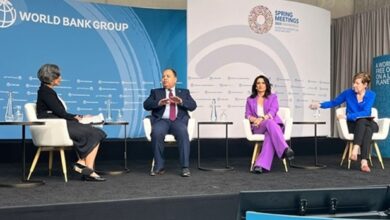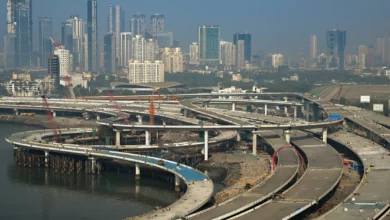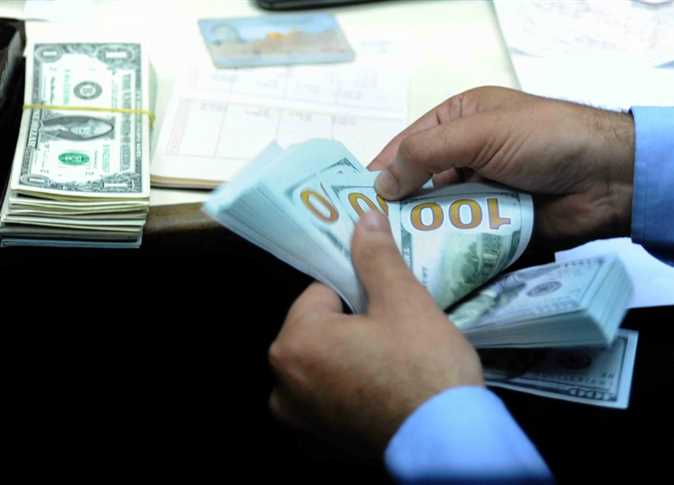
Former Finance Minister Ahmed Galal has said that the Egyptian economy can grow by between 4 and 4.5 percent with little effort. He noted that what is more important is to ensure sustainability and make sure that all resources have been tapped into.
Galal enumerated a number of threats facing the economy at present, including the political and security situation, the budget deficit, public debt, unemployment and the vagueness of monetary policies.
He said that the foreign trips taken by President Abdel Fattah al-Sisi improve Egypt’s international relations and bring the world’s attention to the importance of combating terrorism from a holistic perspective.
Q: What are the most notable threats to the national economy at present?
A: Those would be the same dangers we have spoken about for a long time, though they have become less intense. The most important are the political and security situations, in addition to the budget deficit, public debt, unemployment and the vague objectives set for the monetary policies.
Q: What about other structural problems?
A: Most notable is the lack of competition within the economy. The basic infrastructure is also incomplete and sectors providing basic social services are not performing well enough. There are also issues with pricing policies, financial entanglements and flaws in the social insurance system.
Q: What expectations did you have for the government that were not realized?
A: I expected a short-term, clearly outlined plan on macroeconomic policies and energy subsidization reforms. I still see that as important, disregarding increases or declines in petroleum prices. It is essential to find a means of addressing the budget deficit and resources that are to be directed to low-income and poor citizens.
Q: The value added tax (VAT) has been delayed since the government of Hazem al-Beblawi.
A: As a finance minister, I had taken that tax seriously and invited experts from the International Monetary Fund more than once. It was almost ready when I left office in March 2014 and I expected it to be enacted in April 2014. I still believe we need a comprehensive taxation reform that involves progressive income taxes.
Q: What are the benefits of the president’s foreign trips?
A: They improve our international relations and draw the world’s attention to the necessity of combating terrorism in a holistic manner. The visits give a positive image of Egypt, opening new markets and attracting capital. We should not forget that we are suffering from a savings gap and are in need of direct foreign investment. So, the president’s visits stimulate investors to head to Egypt. However, those investments cannot be ensured without providing a good environment for local investors in the first place. Domestic investors account for 80 percent of a successful investment and the remaining 20 percent should not distract us from that.
Q: So, what needs to be done immediately, at home?
A: Activating the economy by utilizing stalled or untapped resources. If there is a factory that runs one working shift when it can run three, then we are losing an already spent capital. If we have thousands of residential units in the Northern Coast that are used for only one or two months a year, that’s an unused power, etc. I know that’s not as attractive as starting new projects, but these are things that need great attention.
Q: Is a 5 percent growth rate achievable this year?
A: Egypt’s economy can grow by between 4 and 4.5 percent with little effort, but more important than that is to ensure sustainability and tap into all resources.
Q: You spoke frequently about how policy leads the economy. Now that we are close to the parliamentary elections, do you predict an economic headway?
A: Democratization and the formation of democratic institutions is a lengthy process and we need to possess a vision and focus on our goals. Some things in Egypt are still vague and represent a source of concern or pessimism, but I keep optimistic all the time by looking ahead. Egypt will eventually become a modern, democratic state with a strong society and a regime that is accountable. Therefore, an economic headway might take longer in order to form its basis. A good political system forms a good economic policy and a satisfying economic outcome.
Q: Would political institutions be complete after a parliament is elected?
A: There is a difference when political institutions are complete on paper and when they are actually complete in reality. The pro forma consummation of institutions is easy. But in practice, it takes time and relies on how mature and determinate the public is. Uniting Egyptians against terrorism is justifiable and necessary, but to have one unified voice in politics is unfavorable and rather harmful.
Q: It is said that the government exhibits some populist inclinations, are there consequences for that?
A: As with any other transitional, short-lived government, the incumbent government does not have a time framework that allows it to think in a strategic manner. It is not, therefore, obliged to adopt long-term goals. That’s why it is more interested in short-term and present issues. After a parliament is elected, the government will have a longer life. Even if the current government remains after parliament, it will perform differently and the parliament will be there for accountability.
Q: Some see a gap between the regime and businessmen, what do you think?
A: I hope everyone keeps his own role. The government should act as a regulator and a protector of public interest, while businessmen of all standings work to make profit within a sound framework. But if that framework is flawed, that deficiency should be amended before we blame businessmen and the government can either bring the best or the worst out of businessmen.
Q: Where does social justice stand within the government’s policies?
A: We have lacked a thorough perspective of social justice for a long time, though we should one having experienced two revolutions. Economic policies should have a social dimension in the first place, taking care of education and healthcare as keys to enhanced living conditions.
Q: What is the missing piece in the current economic dialogue?
A: The building of institutions because it does not take its deserved share of public debates or government interest. Many of the defects in Egypt are caused by flaws in the institutional structure. There is a state of overlapping among various authorities, sometimes between the executive and monetary authorities, as well as between the arbitrator and the regulator. We have the same problem among the electricity, communications, banking and export sector. We are still unable to create a real independence among regulatory and organizational bodies and society is still unrepresented in such issues. I have attempted to set a model for the formation of panels tasked with challenging the real estate tax by proposing a tripartite representation of the Egyptian Tax Authority, property owners and neutral persons with a hope of using that model.
Q: Do you predict harmony or clash between the president and the next parliament?
A: All world parliaments see intense discussions between the government and the opposition. We do not need to personalize matters, but rather follow successful examples. Successful parliaments are distinguished by their ability to peacefully settle differences.
Edited translation from Al-Masry Al-Youm




